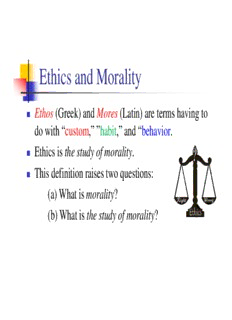
Ethics and Morality - Armstrong PDF
Preview Ethics and Morality - Armstrong
Ethics and Morality Ethos (Greek) and Mores (Latin) are terms having to (cid:1) do with “custom,” ”habit,” and “behavior. Ethics is the study of morality. (cid:1) This definition raises two questions: (cid:1) (a) What is morality? (b) What is the study of morality? What is Morality? Morality can be defined as: (cid:1) A system of rules for guiding human conduct, and principles for evaluating those rules. Two points are worth noting in this definition: (cid:1) (i) Morality is a system; and (ii) It is a system comprised of moral rules and principles. Moral rules can be understood as "rules of conduct," (cid:1) which are very similar to "policies." Rules of Principles conducts Rules of Conduct as “Policies” Policies range from formal laws to "informal, (cid:1) implicit guidelines for actions" (Moor, 1999) Moor suggests that every act can be viewed as an (cid:1) instance of a policy. There are two kinds of rules of conduct: (cid:1) (1) Directives for guiding our conduct as individuals (at the micro-level) “Don’t Steal”, “Do not harm others” (2) Social Policies framed at the macro-level “Software that used to invade the privacy of others” Directives Directives are rules (of conduct) that guide our actions (cid:1) and thus direct us to behave in certain ways. Rules such as "Do not steal" and "Do not harm others" are (cid:1) both examples of rules of conduct that direct us in our individual moral choices at the "micro-ethical" level (i.e., the level of individual behavior). micro-ethical level Rules that guide our action Social Policies (cid:1) Other rules of conduct guide our actions at the "macro-ethical" level by helping us frame social policies. Rules such as "proprietary software should not be copied" or (cid:1) "software that can be used to invade the privacy of users should not be developed" are examples of rules of conduct that arise out of our social policies. A correlation between directives and social policies (e.g., rules (cid:1) involving stealing). macro-ethical level Rules that help us frame our social policies Principles The rules of conduct in a moral system are evaluated (cid:1) against standards called principles. For example, the principle of "social utility," which is concerned (cid:1) with promoting the greatest good for the greatest number, can be used to evaluate a social policy such as "proprietary software should not be copied without permission." Rules of conduct (proprietary information) Social Rules of conduct utility Rules of conduct Principles of evaluation Principles (continued) In the previous example, the social-utility principle (cid:1) Example: Policy pertaining to proprietary software can be justified on the (cid:1) above moral grounds. A certain policy could be justified (on utilitarian grounds) (cid:1) by showing that following the rule for not allowing the unauthorized copying of software would produce more overall social utility (greater good for society). Rules of conduct (proprietary information) Social Rules of conduct utility Rules of conduct Principles of evaluation based on Utilitarian ground Figure 2-1: Basic Components of a Moral System Rules of Conduct Principles of Evaluation (Action-guiding rules, in the form (Evaluative standards used of either directives or social to justify rules of conduct) policies) Examples include principles such two types as of social utility and justice as fairness Rules for guiding the Rules for establishing actions of individuals social policies (micro-level ethical (macro-level ethical rules) rules) Examples include directives Examples include social policies such as: such as:"Do not steal"and "Software should be protected“ and "Do not harm others." "Privacy should be respected." Four features of a moral’s system Public: everyone must know what the rules are (cid:1) Informal: No formal authoritative judges (cid:1) presiding over it Rationality: A moral system is rational and (cid:1) accessible to ordinary peoples Impartial: Morals rules are ideally designed to (cid:1) apply equitably to all participants Values The term value comes from the Latin valere, which translates (cid:1) roughly into having worth or being of worth. Values can be conceived as objects of our desires or interests. (cid:1) Examples of values include very general notions such as: happiness, (cid:1) love, (cid:1) freedom, etc. (cid:1) Moral principles are ultimately derived from a society's (cid:1) system of values.
Description: